Docker in China: usage statistics and success stories
Last Monday, it became aware of the availability of video from the DockerCon 2017 conference, held in the second half of April. In one of the reports sounded there, a representative of Alibaba Cloud (or Aliyun) - a division of the Alibaba Group specializing in cloud computing, IaaS, PaaS, SaaS and Big Data - spoke about Docker's statistics and success stories in China.
This article, which continues our recent publication on global statistics on Docker implementation, collected the most interesting facts from the report of the Alibaba Group, based on a survey of 1000+ users of its public cloud in April of this year and known cases of Docker use. But let's start with the prehistory of the "appearance" of Docker in the world of Chinese information technology ...
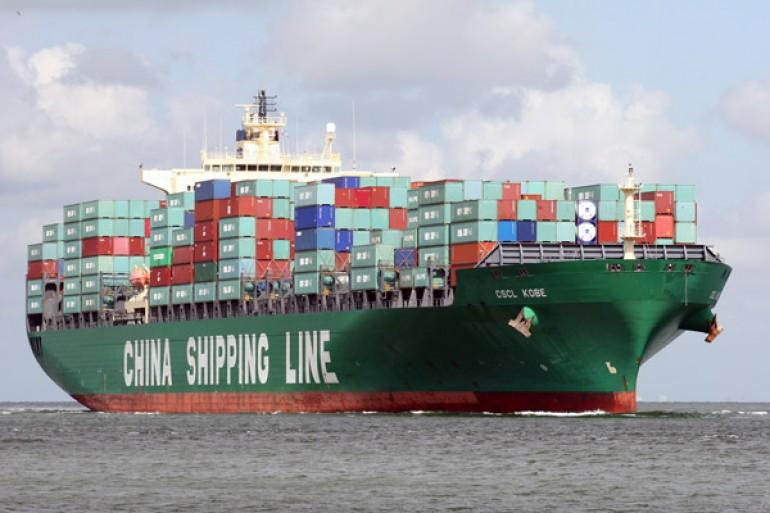
')
Docker's collaboration with Alibaba Cloud was announced in October last year and led to the creation of the Docker Hub in China for distribution across the country of digitized applications from Alibaba Cloud servers. However, industrial use of Docker in the country began much earlier. Not only at the time of the announcement of this collaboration, it was reported that Docker Meetups held meetings in the 20 largest cities of China, but even earlier, in the summer of 2015, a DaoCloud representative spoke in detail at DockerCon SF 2015 about the local Docker community.
One of the earliest major Docker users in the country was Baidu , which in the summer of 2013 developed PaaS called Baidu App Engine with Docker as a backend. More than 10 thousand applications and more than 20 thousand containers (400 containers per 1 host) functioned on it.
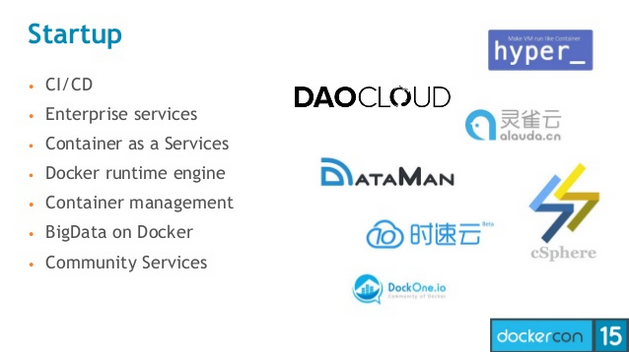
Chinese IT startups whose technological stack is based on Docker (from the 2015 report)
As of June 2015, 9 out of the top 100 contributors to the main repository of the project (docker / docker) were representatives of Chinese organizations (including the particularly active University of Zhejiang), and some of the Docker events had over 3,000 visitors.
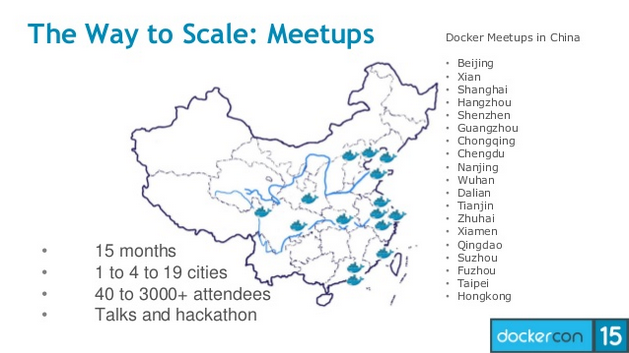
Docker event geography in China
But back to the latest data from Alibaba Cloud. The results of the April survey show that about a third of companies use or begin to use Docker containers:
At the same time, 17% of respondents do not even plan to use Docker in the next six months, but they will most likely use 18%.
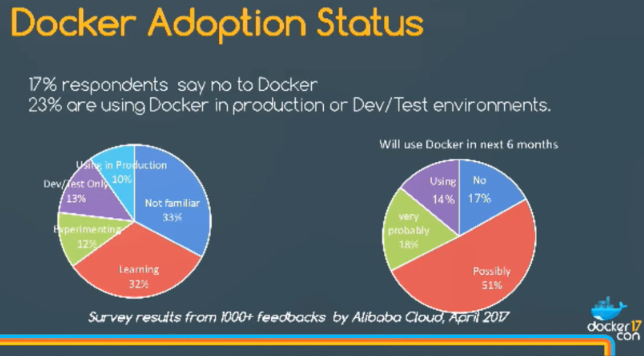
What Docker wants most is speeding up the software development process , as 957 respondents said. Less popular answers:
The main obstacles to Docker adaptation are the lack of knowledge and lack of operating experience . In particular, many customers of the Alibaba Group complain about the lack of training materials on how to use Docker and the fact that existing publications on the Internet are often outdated or not accurate enough. Less concern is attached to the specific issues of using containers: networks, persistent data storage, load migration, security, and so on.
Among the instruments of orchestration, the clear favorite (about 400 respondents) are their own developments . Moreover, many who chose this option noted that they did not even try any ready-made solutions for their tasks. Of the known products, Kubernetes (less than 200 respondents) and Docker Swarm (about 150) lead, with Mesos and other options lagging far behind.
Here are the details of three major Docker deployment success stories:
Tmall is the largest B2C (business-to-consumer) e-commerce platform in China. It was introduced to Taobao nine years ago (originally called Taobao Mall), later it became self-sufficient and today is managed by Alibaba Group.
Every year on November 11, China celebrates the Day of the Bachelors ( Singles' Day ), which is remarkable not only for the celebration of their marital status, but also for the world's largest online sales per day. Sales of sites Tmall and Taobao on the Day of Bachelors of 2016 amounted to 17.8 billion USD. And in the case of Tmall, all key business systems of the platform were containerized, servicing 175 thousand transactions per second. The Docker Swarm cluster created for these tasks served more than 30 thousand nodes and is called the largest authors in the world. The distribution system used in Tmall Docker images supported up to 7,000 simultaneous pull'ov.
Sina Weibo is the largest microblogging service in China (100 million posts per day) and one of the most popular sites in the country (more than 30% of local Internet users work with it).
The main problem in its maintenance is sharp surges in attendance (for example, 3-fold growth) in the case of high-profile events (news) or public holidays. The private cloud used in the Weibo infrastructure works with both bare metal and virtualization (based on OpenStack and KVM), but these resources are limited (and available). The problem was solved by switching to containers within the framework of the DCP (Docker Container Platform) , which unified the management of applications and made possible the use of a hybrid cloud: additional containers are launched in the public cloud, the number of which can be easily and quickly scaled depending on the existing load (1 thousand nodes are deployed in 10 minutes).
(Some information about the technical device of the Docker Container Platform can be found in this presentation , but be prepared for Chinese.)
One of the largest public investment corporations in China has 44 subsidiaries in different countries. Its engineers were engaged in creating a software platform (CITIC Industrial Cloud), integrating various cloud services, the capabilities of which are used by subsidiaries, as well as by numerous partners and customers. The result - the CITIC platform acts as an intermediary providing access to different services, and for the unification and delivery of industry-specific financial applications was made chosen in favor of containerization with Docker.
Alibaba does not just use containers for its needs, but has prepared a comprehensive solution for providing them as services integrated with its cloud services. The “Docker practice in Alibaba Cloud” was told last year at DockerCon US 2016. The Alibaba Cloud Container Service is designed to manage containerized applications running in the distributed cluster of Alibaba Cloud ECS. Containers and cloud services are described in a declarative format, after which users are available to deploy in one click. Full compatibility with Docker Swarm and Docker Compose is declared, APIs are available for integration with CI / CD systems. Curiously, Aliyun Container Service is available for free , and it pays off by purchasing the necessary cloud resources (ECS, load balancer, etc.).
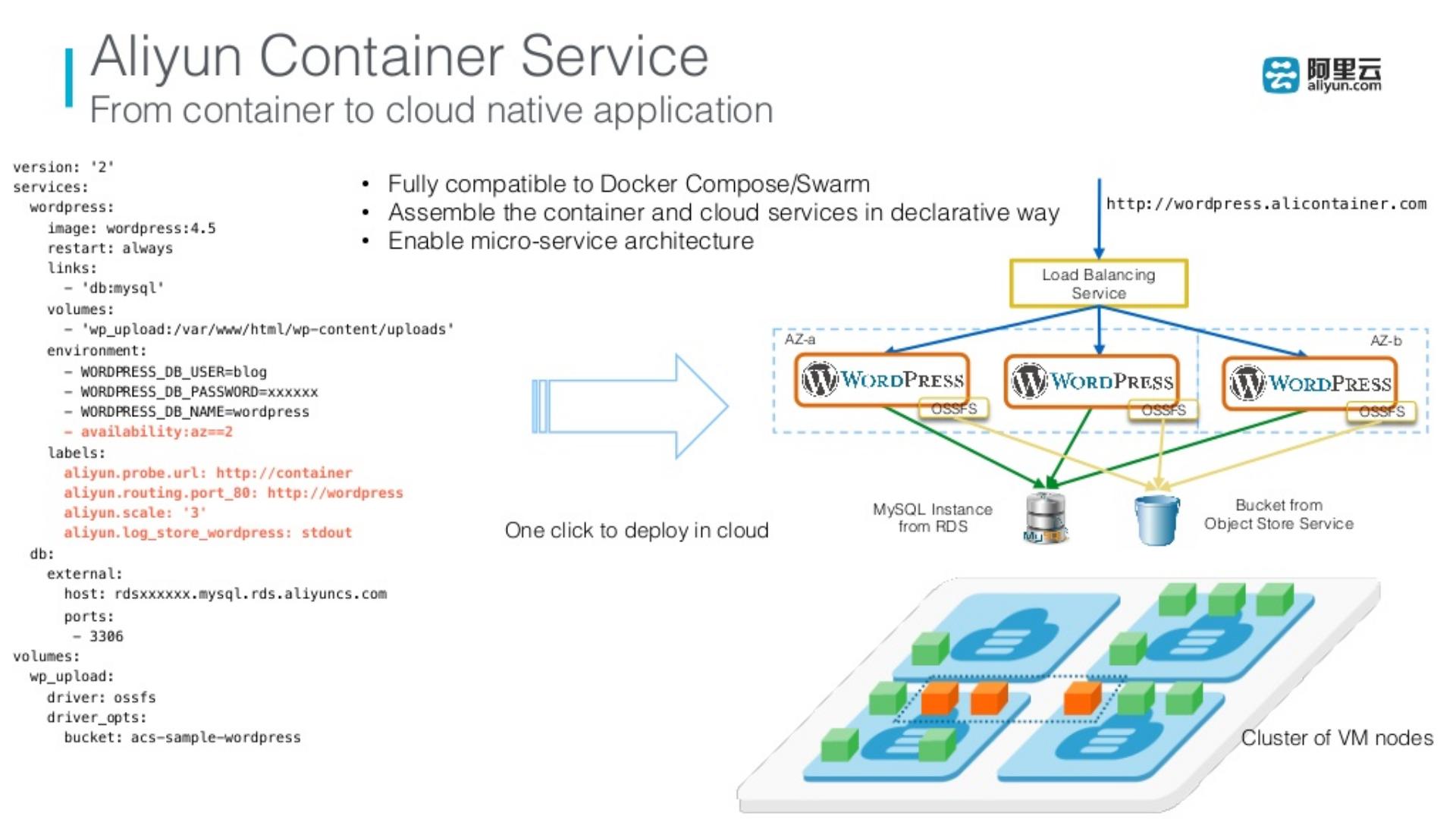
Further Docker production-production experience led Alibaba Cloud to create the Apsara Stack Agility cloud platform, integrated with the Docker Enterprise Edition and offering ready-to-use IaaS (infrastructure-as-a-service) and CaaS functions to Chinese companies (containers-as-a-service ). Her announcement took place at DockerCon 2017.
Alibaba is not the only driving force behind Docker's enterprise-application in China. Huawei , for example, has its PaaS - FusionStage, - based on Docker and Kubernetes. Young companies that are dedicated to the infrastructure built around containers, such as Caicloud with their Cluster-as-a-Service (ClaaS) based on Kubernetes and HarmonyCloud , which also creates PaaS based on Docker and Kubernetes, are also growing.
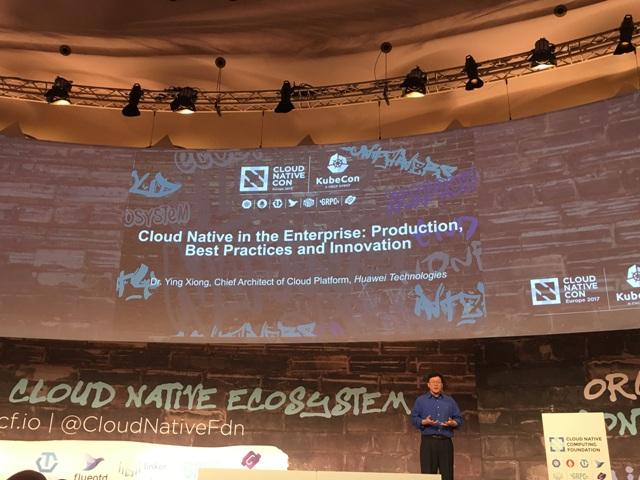
Presentation of the best practices for Huawei cloud native on KubeCon (CloudNativeCon)
Let Docker's adaptation in China has not yet become truly mass, but the examples already available today confirm not only the viability of containers in production, but also the real benefits of using them to solve business problems.
Read also “ What famous companies use Docker in production and for what? »And subscribe to our hub for updates!
This article, which continues our recent publication on global statistics on Docker implementation, collected the most interesting facts from the report of the Alibaba Group, based on a survey of 1000+ users of its public cloud in April of this year and known cases of Docker use. But let's start with the prehistory of the "appearance" of Docker in the world of Chinese information technology ...

')
Docker first steps in China
Docker's collaboration with Alibaba Cloud was announced in October last year and led to the creation of the Docker Hub in China for distribution across the country of digitized applications from Alibaba Cloud servers. However, industrial use of Docker in the country began much earlier. Not only at the time of the announcement of this collaboration, it was reported that Docker Meetups held meetings in the 20 largest cities of China, but even earlier, in the summer of 2015, a DaoCloud representative spoke in detail at DockerCon SF 2015 about the local Docker community.
One of the earliest major Docker users in the country was Baidu , which in the summer of 2013 developed PaaS called Baidu App Engine with Docker as a backend. More than 10 thousand applications and more than 20 thousand containers (400 containers per 1 host) functioned on it.

Chinese IT startups whose technological stack is based on Docker (from the 2015 report)
As of June 2015, 9 out of the top 100 contributors to the main repository of the project (docker / docker) were representatives of Chinese organizations (including the particularly active University of Zhejiang), and some of the Docker events had over 3,000 visitors.

Docker event geography in China
How many people use Docker in China?
But back to the latest data from Alibaba Cloud. The results of the April survey show that about a third of companies use or begin to use Docker containers:
- 33% are not familiar with Docker;
- 32% are studying only;
- 13% - used in development and for testing;
- 12% start using it somehow;
- 10% - used in production.
At the same time, 17% of respondents do not even plan to use Docker in the next six months, but they will most likely use 18%.

What dockers expect and what hinders implementation?
What Docker wants most is speeding up the software development process , as 957 respondents said. Less popular answers:
- Improve Resource Utilization (684).
- Make applications portable (501).
- Implement support for microservice architecture (428).
- Improve control and standardization (425).
- Provide hybrid cloud support to avoid dependence on a single service provider (387).
The main obstacles to Docker adaptation are the lack of knowledge and lack of operating experience . In particular, many customers of the Alibaba Group complain about the lack of training materials on how to use Docker and the fact that existing publications on the Internet are often outdated or not accurate enough. Less concern is attached to the specific issues of using containers: networks, persistent data storage, load migration, security, and so on.
How to use Docker?
Among the instruments of orchestration, the clear favorite (about 400 respondents) are their own developments . Moreover, many who chose this option noted that they did not even try any ready-made solutions for their tasks. Of the known products, Kubernetes (less than 200 respondents) and Docker Swarm (about 150) lead, with Mesos and other options lagging far behind.
Here are the details of three major Docker deployment success stories:
1. Tmall
Tmall is the largest B2C (business-to-consumer) e-commerce platform in China. It was introduced to Taobao nine years ago (originally called Taobao Mall), later it became self-sufficient and today is managed by Alibaba Group.
Every year on November 11, China celebrates the Day of the Bachelors ( Singles' Day ), which is remarkable not only for the celebration of their marital status, but also for the world's largest online sales per day. Sales of sites Tmall and Taobao on the Day of Bachelors of 2016 amounted to 17.8 billion USD. And in the case of Tmall, all key business systems of the platform were containerized, servicing 175 thousand transactions per second. The Docker Swarm cluster created for these tasks served more than 30 thousand nodes and is called the largest authors in the world. The distribution system used in Tmall Docker images supported up to 7,000 simultaneous pull'ov.
2. Weibo
Sina Weibo is the largest microblogging service in China (100 million posts per day) and one of the most popular sites in the country (more than 30% of local Internet users work with it).
The main problem in its maintenance is sharp surges in attendance (for example, 3-fold growth) in the case of high-profile events (news) or public holidays. The private cloud used in the Weibo infrastructure works with both bare metal and virtualization (based on OpenStack and KVM), but these resources are limited (and available). The problem was solved by switching to containers within the framework of the DCP (Docker Container Platform) , which unified the management of applications and made possible the use of a hybrid cloud: additional containers are launched in the public cloud, the number of which can be easily and quickly scaled depending on the existing load (1 thousand nodes are deployed in 10 minutes).
(Some information about the technical device of the Docker Container Platform can be found in this presentation , but be prepared for Chinese.)
3. CITIC Group
One of the largest public investment corporations in China has 44 subsidiaries in different countries. Its engineers were engaged in creating a software platform (CITIC Industrial Cloud), integrating various cloud services, the capabilities of which are used by subsidiaries, as well as by numerous partners and customers. The result - the CITIC platform acts as an intermediary providing access to different services, and for the unification and delivery of industry-specific financial applications was made chosen in favor of containerization with Docker.
How do Docker is used in Alibaba itself?
Alibaba does not just use containers for its needs, but has prepared a comprehensive solution for providing them as services integrated with its cloud services. The “Docker practice in Alibaba Cloud” was told last year at DockerCon US 2016. The Alibaba Cloud Container Service is designed to manage containerized applications running in the distributed cluster of Alibaba Cloud ECS. Containers and cloud services are described in a declarative format, after which users are available to deploy in one click. Full compatibility with Docker Swarm and Docker Compose is declared, APIs are available for integration with CI / CD systems. Curiously, Aliyun Container Service is available for free , and it pays off by purchasing the necessary cloud resources (ECS, load balancer, etc.).

Further Docker production-production experience led Alibaba Cloud to create the Apsara Stack Agility cloud platform, integrated with the Docker Enterprise Edition and offering ready-to-use IaaS (infrastructure-as-a-service) and CaaS functions to Chinese companies (containers-as-a-service ). Her announcement took place at DockerCon 2017.
Conclusion
Alibaba is not the only driving force behind Docker's enterprise-application in China. Huawei , for example, has its PaaS - FusionStage, - based on Docker and Kubernetes. Young companies that are dedicated to the infrastructure built around containers, such as Caicloud with their Cluster-as-a-Service (ClaaS) based on Kubernetes and HarmonyCloud , which also creates PaaS based on Docker and Kubernetes, are also growing.

Presentation of the best practices for Huawei cloud native on KubeCon (CloudNativeCon)
Let Docker's adaptation in China has not yet become truly mass, but the examples already available today confirm not only the viability of containers in production, but also the real benefits of using them to solve business problems.
Read also “ What famous companies use Docker in production and for what? »And subscribe to our hub for updates!
Source: https://habr.com/ru/post/328380/
All Articles